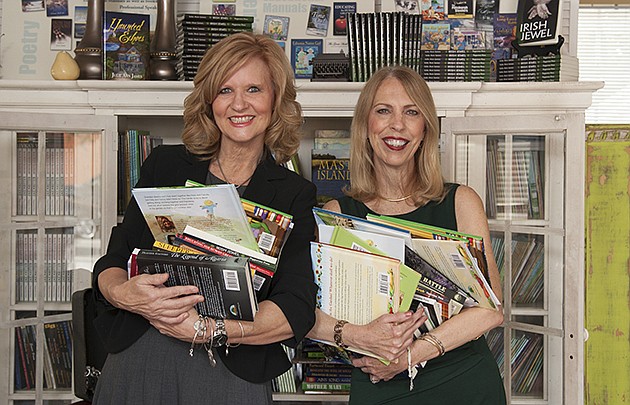Executive Summary
Company. Peppertree Press Industry. Publishing Key. Company has survived the publishing industry tumult.
Julie Ann James brings out a well-preserved notepad when she gives talks around the area.
“This is my very first story; I was 10 years old when I wrote it,” she says while gently flipping the pages. “I never did publish it, but I'd always wanted to be a writer since I was a little girl.”
The publisher and founder of Peppertree Press in Sarasota has since realized that dream and now helps other authors do the same. Since the company's inception in 2006, it's worked with more than 600 authors and published some 800 books in genres ranging from fiction and children's literature to autobiographies and cookbooks.
Peppertree Press puts out about 75 books a year, with 25 to 30 books in the works at any one time. James considers that a healthy workflow for the company and anticipates remaining on that path for the foreseeable future. (She declined to provide revenue figures.)
“I expect that steadiness to continue,” she says. “We are here to stay. It is a day-by-day, moment-to-moment love of this business that keeps us going.”
It's also a business surrounded by a lot of questions and concerns over the past several years, which have seen eBooks explode onto the scene and plenty of big-name and independent bookstores shut their doors. But James remains optimistic about the world of independent book publishing.
“We have not had anything I can think of that has been detrimental,” she says, “or anything that has made us think we're going to have to come up with something else to do down the road because this is going to go away.”
Page by page
According to StatShot Annual, a yearly statistical survey released by the Association of American Publishers, the U.S. book and journal publishing industry generated $27.98 billion in net revenue for 2014, up 4.6% from 2013. The trade category — in which Peppertree Press operates — was responsible for much of that growth.
But there's not much in the way of statistics focused solely on independent publishers, says Angela Bole, executive director of the Independent Book Publishers Association. The most recent figures she can point to are from 2012's BookStats, a collaborative effort by the Book Industry Study Group and the AAP.
That report found that from 2008 to 2011, publishers with annual net sales between $500,000 and $5 million grew unit sales by more than 25%, double the industry growth rate. And publishers with less than $500,000 in annual net sales grew unit sales by nearly 23%. These types of publishers also saw revenue growth four to five times the national average.
“Depending on the degree to which indie publishers are able to identify their niche and work with known, reputable distributors, I see no reason why they couldn't be successful,” says Bole. “And the more titles you have to leverage, the better your ability to get into traditional distribution channels.”
The rise of eBooks also hasn't resulted in quite the impact once thought possible. Sales of eBooks fell 10% in the first half of 2015 according to the AAP, and the category only represents about a quarter of all book sales. More than 510 million eBooks were sold in 2014, compared with 568 million hardbacks and 942 million paperbacks.
James and Teri Lynn Franco, Peppertree Press's editorial director, admit they weren't sure about eBooks at first. “We kind of dug our heels in in the beginning and said we don't think we want to do them,” says Franco. But the company now offers eBooks, though most authors they work with still primarily want paperback or hardback versions of their books.
Bole also thinks independent publishers have an advantage in this low-margin industry that's going digital and DIY. “They can be a little more agile in terms of business practices,” she says. “They don't have high overheads and can work a lot cheaper than the larger players can, which has helped a lot of them ride the wave.”
James and Franco are the only full-time employees at Peppertree. The editors, designers and others they work with are all independent contractors, which provides a big asset: flexibility. “Anything that we get that's a suggestion we take to heart and mull it over,” says Franco. “We're not stuck on any one particular way to do things.”
The full story
James and Franco met as preschool teachers. James was writing children's books on the side and sending them off to big publishing houses, “the ones that kept sending me regret letters,” she says. “I was so tired of hearing the regrets I said, 'I think I'm going to start a literary magazine.'”
She launched Pepper Tree Magazine in 2004. It started out small but now has a print circulation of 21,000 and is available at 150 locations around Sarasota. She launched Peppertree Press in 2006, when both she and Franco were ready to move on from preschool to a new venture. Peppertree Press now pays for the magazine, which is available for free and serves as a marketing tool for the publishing company. “We did seven books that first year and were thrilled that the lights were still on,” says Franco. “And then it just took on its own life.”
Peppertree Press reviews all submissions for quality, but it's only rejected a handful of manuscripts over the years. “Everyone has a different take on writing, and we don't say that's the right way to write or the wrong way to write, because it's their style,” says James.
The company, which works with authors worldwide, also provides clients/writers with a personal touch they probably wouldn't get at either the big publishing houses or a self-publishing operation. “The authors get to sit right across from us and talk or pop in and have tea,” says James. “We don't consider our authors customers; we consider them our friends.”
Authors pay the company a publishing fee of $1,975 for their first book (the fee drops to $1,800 for subsequent books). The company then provides the author with design and editing services, gets them ISBN and Library of Congress numbers, and handles distribution to online retailers such as Amazon, Books-a-Million, and Barnes & Noble. The copyright remains in the author's name, and they can promote and sell the book on their own as well.
Big deal
When a book sells, the author, Peppertree Press, and the retailer all get a share. A 200-page paperback book, for example, costs $7 to print (2 cents per page and $3 for the cover).
Peppertree's profits come from that expense. Authors can set their own price for their books; James advises doubling the printing cost and adding a dollar or so. If authors purchase books from Peppertree Press at the wholesale price and sell them on their own at book signings and other events, their portion of the royalties increases by cutting out the retailer middleman.
“The publishing is almost the easy part,” says Matt Heller, a leadership, customer service and employee motivation consultant who published his book “The Myth of Employee Burnout,” through Peppertree Press. “The book's not going to sell itself. You can put it on Amazon, but people aren't necessarily going to find it. You've got to do the legwork.”
Book sales, of course, are great. But for many authors, just getting their words onto the printed page is payout enough. Recognizing this, James and Franco mark the moment they present authors with their finished books for the first time.
“We make them close their eyes and hold their hands out, and then we hand them their book and they cry and we take pictures,” says James. “It's so much fun. As an author myself I know how it feels to have your book in your hands for the first time. It is the coolest thing.”
Over the long-term, James and Franco would like to add more romance writers to their author list. They have another big-picture goal: cinematic glory. “It would be more than fun to have one of our books taken to film,” says Franco. “That would be a very exciting thing for the author and for us.”
“And all we'd want,” adds James, “is popcorn and a ticket.”






